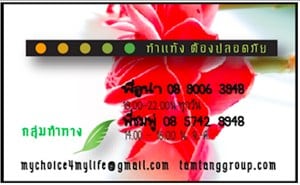
The Telegraph, a British newspaper, reported this month that the discovery in 2010 of a ‘foetus mortuary’ in 2010, where the cremation of more than 2,000 foetuses was delayed because of a broken furnace, had re-shaped Thailand’s abortion laws afterwards. Suddenly, the issue was splashed across front pages and evening news broadcasts. Thailand could no longer ignore the fact that women were regularly risking their lives to undergo unsafe abortions. It took until four years ago for the law to be revised to decriminalise abortion and an even more recent amendment allowed abortions to be carried out up to 20 weeks into a pregnancy.
Yet affordable, safe and convenient services are still limited – even in Bangkok. According to a recent report by the pro-choice activist group TamTang, none of the 22 public hospitals in Bangkok provides subsidised abortions. This year they met with the Department of Health under the Bangkok administration (which runs the public hospitals), and the doctors said that abortion was not necessary – that ‘it’s like having a nose job’. Their real point was: “If you want an abortion, pay for it yourself.”
As a result, a two-tiered system has emerged – only those able to travel hours out of the city to hospitals providing subsidised procedures, or with the money to pay for private care, are able to access services. And across the country, according to government figures, hospitals in just 39 of Thailand’s 77 provinces have officially registered as abortion providers.
The price in the private sector starts at 5,000 baht (£110), which is about 15 times the daily minimum wage, which means no one on a low wage can afford it. Instead, many go to uncertified shops on the internet that sell abortion pills. Often, the pills aren’t effective.
Earlier this month, a health minister linked abortion rates to concerns about Thailand’s falling birth rates – and suggested “amending existing laws or drafting new laws” to reduce terminations. “We all know that the law or restrictions will not decrease the numbers of abortions but only increase the number of unsafe abortions,” says TamTang’s founder, Supecha Baotip.
At least 90% of Thailand’s population identifies as Buddhist, and many from the conservative Theravada Buddhist majority believe that abortion directly contradicts teachings. Some activists are therefore using religious language to discuss terminations and raise support – TamTang, for instance, has performed ceremonies in honour of the victims of unsafe abortions.
For Buddhists, the first precept is not to kill any life form. The traditional belief is that it is wrong to prevent birth; even contraception was once considered wrong. Recently, a Buddhist monk, Phra Shine Waradhammo, age 55, has become increasingly vocal about his pro-abortion stance. In spite of a lot of criticism, he is focused on creating a space to share experiences on Facebook, where he now has thousands of followers and regularly posts about women’s rights and LGBTQ+ issues.
“Women are shamed and blamed for so much when it comes to sex and abortion,” he says. “My message to people is that they are not alone – that I, as a monk, do not deny their existence. That a religious figure in orange robes supports them.”
Still, many in the medical profession are hesitant to provide abortions. Thailand’s abortion laws do not require any doctor to do an abortion if they object. However, they are supposed to refer women to other services. Some do this, often through the 1663 hotline or the Referral for Safe Abortion network. But, TamTang said, many do not.
“Many doctors are on the fence about abortion, and it’s still challenging to convince the doctors [to perform abortions],” says Tossaporn Sereerak, chair of a Thai parliamentary health commission. But the activists warn that bureaucratic inertia, stigma and a lack of political will means little has been done to expand affordable access or to combat misinformation.
SOURCE: The Telegraph, by Sarah Newey, 15 March 2024 ; SEE ALSO: New abortion law does not respect international human rights principles, say CSOs. ICWRSA Newsletter, 3 February 2021. VISUAL from: Women Help Women on TamTang Group



